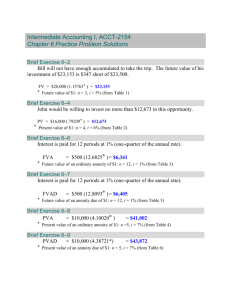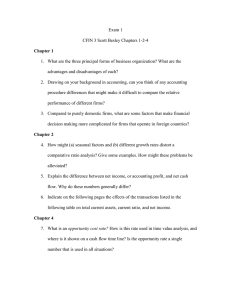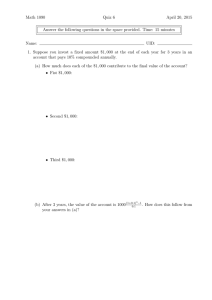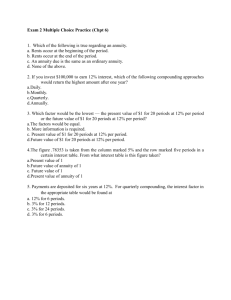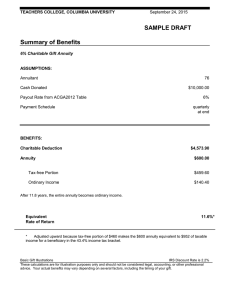ACTUARIAL NOTE: VALUATION OF THE
advertisement
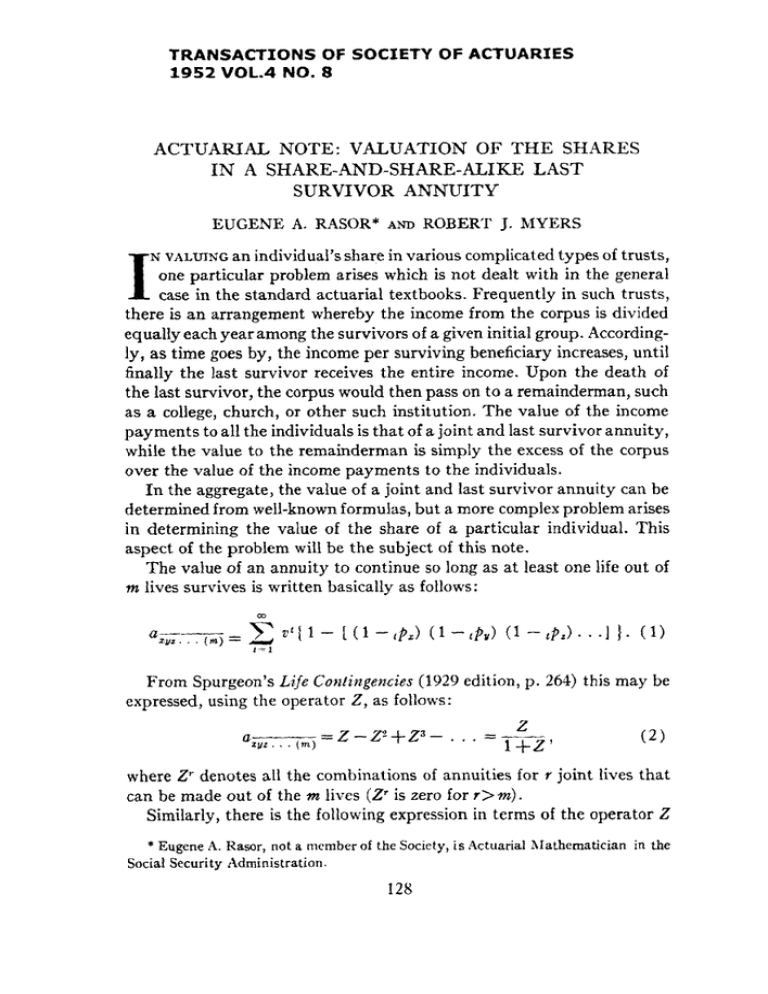
T R A N S A C T I O N S OF S O C I E T Y OF A C T U A R I E S
1 9 5 2 V O L . 4 NO. 8
ACTUARIAL NOTE: VALUATION OF THE SHARES
IN A SHARE-AND-SHARE-ALIKE LAST
SURVIVOR ANNUITY
EUGENE A. RASOR* Am) ROBERT J. MYERS
N VALIIn,;c an individual's share in various complicated types of trusts,
one particular problem arises which is not dealt with in the general
case in the standard actuarial textbooks. Frequently in such trusts,
there is an arrangement whereby the income from the corpus is divided
equally each year among the survivors of a given initial group. Accordingly, as time goes by, the income per surviving beneficiary increases, until
finally the last survivor receives the entire income. Upon the death of
the last survivor, the corpus would then pass on to a remainderman, such
as a college, church, or other such institution. The value of the income
payments to all the individuals is that of a joint and last survivor annuity,
while the value to the remainderman is simply the excess of the corpus
over the value of the income payments to the individuals.
In the aggregate, the value of a joint and last survivor annuity can be
determined from well-known formulas, but a more complex problem arises
in determining the value of the share of a particular individual. This
aspect of the problem will be the subject of this note.
The value of an annuity to continue so long as at least one life out of
rn lives survives is written basically as follows:
I
oo
a~v. . . . ( ~ ) = ~
v'{1--[(1--,p~)(1--,pv)(1--,p,)...]}.
(1)
From Spurgeon's L i f e C o n l i n g e n c i e s
(1929 edition, p. 264) this may be
expressed, using the operator Z, as follows:
Z
a
•~. . . . (m
- Z - Z " - + Z
a-
. . . -
1 +Z'
(2)
where Z r denotes all the combinations of annuities for r joint lives that
can be made out of the m lives (Z" is zero for r > m).
Similarly, there is the following expression in terms of the operator Z
• Eugene A. Rasor, not a member of the Society, is Actuarial Mathematician in the
Social Security Administration.
128
VALUATION OF SHARES IN A LAST SURVIVOR ANNUITY
129
for the value of an annuity payable only while exactly n lives out of m
lives survive:
Inl
Zn
ax~. . . . ~'-----~= ( l + Z ) "+~"
(3)
The value V~, of w's share in a share-and-share-alike last survivor
annuity involving m other lives may be expressed as follows:
1
V~ =
Irl
r + 1" %:*-if-:: ('~)"
(4)
r~0
Using another operator Z, which is somewhat different from the one
discussed previously, equation (4) may by analogy with (3) be expanded
in powers of Z. Here Z ~signifies the sum of the values of annuities payable
during the joint lifetime of the life w and each of the combinations of r
lives that can be made out of the m lives. In equation (3), Z ° has no meaning and is thus inapplicable, while here Z ° by definition represents a~. The
expansion of the a's in equation (4) takes exactly the same form as (3)
since the operator Z now used is the same as that in (3) except that in
all cases it involves the independent life w, as does the annuity value in
(4) as compared with that in (3). Thus we have:
1/'~= .~
1
r+l
Z~
Z°
( I + Z ) ~+~= ( I + Z )
Z
~ 2 ( I + Z ) ~-
(5)
Z -o
+3 (l+Z)S
~- . . . .
Thus
1
Z
1
(6)
o
=z
Z
Z~
Z~
-~+y--4-+...q
(-Z)"-I
m
Z,
V,,,=a,~-}(a,~,+a,,~+a,,,~+...)+{(a,,,~+a,~.~,+...)-....
Then by substituting back for the operator
(7)
Formula (7) can be checked by general reasoning. If w is still alive and
all others are dead, then only the first term remains, thus providing the
desired payment of 1 to w. If w and only one other life are alive, only the
first two terms remain, and in the second one all the annuity values but
one are eliminated so that the net payment to w is, as required, }. Likewise if only w and two others are alive, all terms but the first three vanish,
and in the second term only two a's remain, while in the third term only
one a remains; accordingly, the net result is a payment of one-third, which
130
VALUATION
O F SIL4_RES IN A LAST S U R V I V O R
ANNUITY
is as required. For the general case of w and r other lives being alive, the
proportion payable to w is the s u m of the coefficients,or
r
r
C~4_C~
l-~__-i-...-r+l
I
(C[+,_C~+~+C~+,_
""
.)
(S)
1
r+l
1
[1-
(1-
1)r+l]
r+l
which is as required.
Furthermore, it can readily be shown that if values of V are obtained for
each of the other m lives in the same way, and if all the V's are summed,
there is obtained equation (1), which is, of course, a necessary condition
as to the correctness of equation (7).
